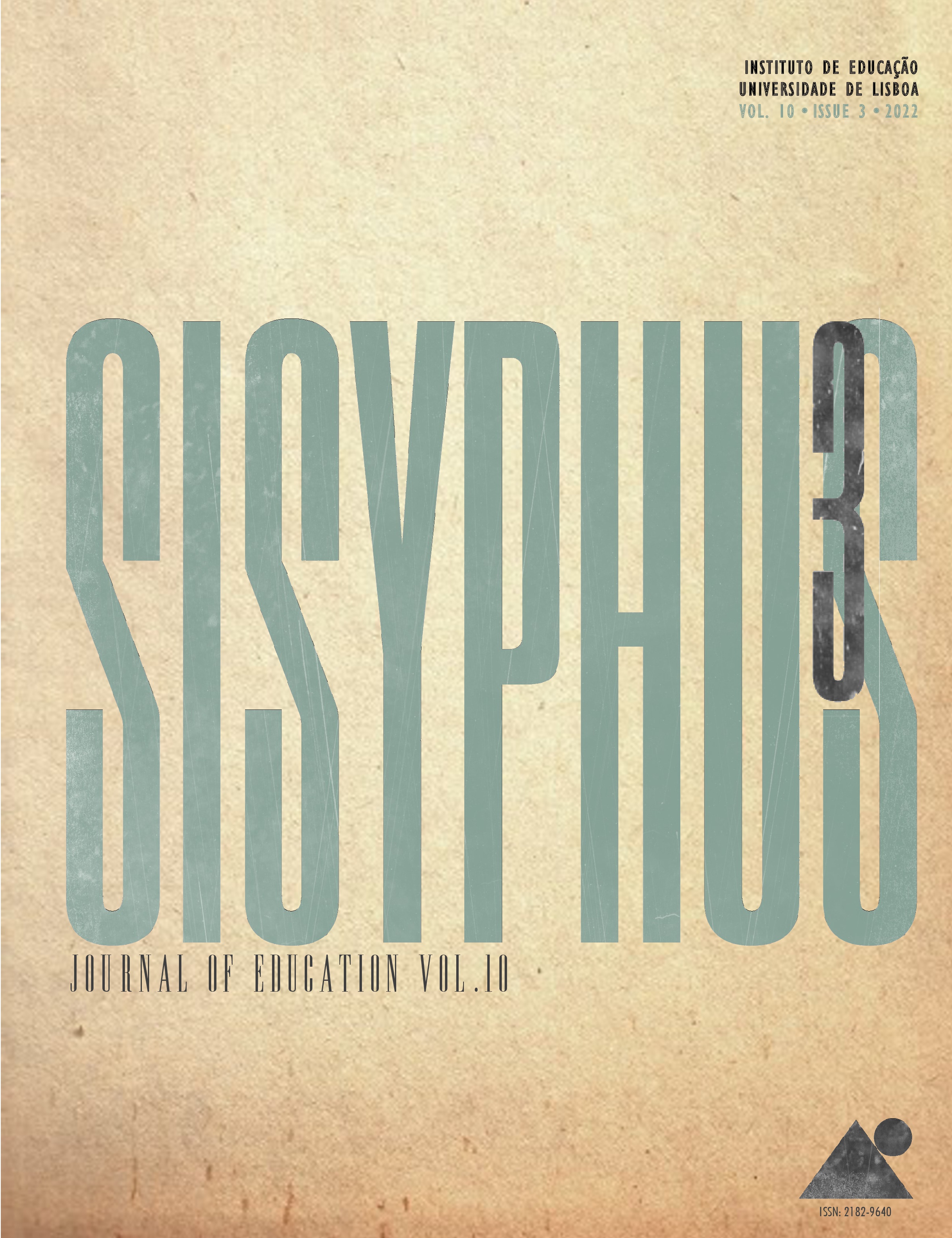Inteligencias Múltiples en el Contexto de Aprendizaje del Inglés
Desafíos en la Planificación de las Clases
DOI:
https://doi.org/10.25749/sis.26961Palabras clave:
inteligencias múltiples, planificación, maestro, alumno, enseñanza de la lengua inglesaResumen
Este artículo tiene como objetivo presentar los resultados de nuestra investigación sobre los desafíos de la planificación de clases de inglés en la Enseñanza Básica a través del análisis de actividades didácticas propuestas para una clase de 2º año de Básica I en una escuela privada. Se trata de una investigación documental descriptiva con enfoque mixto (cuantitativo y cualitativo) que buscó indagar si las actividades didácticas incluyen aspectos relacionados con la teoría de las inteligencias múltiples (lingüística, musical, lógico-matemática, espacial, corporal-kinestésica, interpersonal, intrapersonal y naturalista) propuesta por Howard Gardner, en 1983 (Gardner, 1994). Del análisis inicial de los planes de clase, los resultados muestran el predominio de actividades que se enfocan exclusivamente en las inteligencias lógico-matemáticas y lingüísticas.
Descargas
Citas
Antunes, C. (2016, October 28). Mas ele(a) não tem didática!. Celso Antunes. Retrieved from: https://www.linkedin.com/pulse/mas-elea-não-tem-didática-celso-antunes/
Armstrong, T. (2001). Inteligências Múltiplas. (2nd Edition). Porto Alegre: Artes Médicas.
Armstrong, T. (2017). Multiple intelligences in the classroom. (3rd Edition). Alexandria: ASCD.
Ballestero-Alvarez, M. E. (2005). Exercitando as Inteligências Múltiplas: Dinâmicas de grupo fáceis e rápidas para o ensino superior. São Paulo: Papirus Editora.
Bearne, E., & Reedy, D. (2017). Teaching Primary English subject knowledge and classroom practice. New York: Routledge.
Berns, R. M. (2002). O Desenvolvimento da criança. São Paulo: Edições Loyola.
Brualdi, A.C. (1996). Multiple Intelligences: Gardner's Theory. ERIC Digest. Institute of Education Sciences. Retrieved from: https://files.eric.ed.gov/fulltext/ED410226.pdf
Chagas, V. (1967). Didática especial de línguas modernas. (Prefácio de Anísio Teixeira). (2nd Edition). São Paulo: Editora Nacional.
Conceição, J. S., Santos, J. F., Sobrinha, M., & Oliveira, M. A. R. (2019). A importância do planejamento no contexto escolar. Faculdade São Luís de França. Retrieved from: https://portal.fslf.edu.br/wp-content/uploads/2016/12/A-IMPORTANCIA-DO-PLANEJAMENTO.pdf
Dolati, Z., & Tahriri, A. (2017). EFL teachers’ multiple intelligences and their classroom practice. SAGE Open, 7(3). doi: 10.1177/2158244017722582
Franze, L. (2008). Inteligências Múltiplas e motivação para a aprendizagem da língua inglesa. Retrieved from: http://www.diaadiaeducacao.pr.gov.br/portals/pde/arquivos/1064-4.pdf
Freire, P. (1996). Pedagogia da autonomia: saberes necessários à prática educativa. (2nd Edition). Porto Alegre: Artes Médicas.
Gardner, H. (1994) [1983]. Estruturas da Mente - A Teoria das Múltiplas Inteligências. (2nd Edition). Porto Alegre: Artes Médicas Sul.
Gardner, H. (2003). Multiple intelligences after twenty years. American Educational Research Association, Chicago, Illinois, 21, 1-15.
Gardner, H. (2006). Multiple Intelligences: New horizons. New York: Basic Books.
Gardner, H. (2021). The Official Authoritative Site of Multiple Intelligences. Retrieved from: https://www.multipleintelligencesoasis.org
Hoffmann, J. M. L. (1994). Avaliação mediadora: uma relação dialógica na construção do conhecimento. Avaliação do rendimento escolar. São Paulo: FDE, 51-9.
Konkiewitz, E. C. (2013). Aprendizagem, comportamento e emoções na infância e adolescência: uma visão transdisciplinar. Dourados: UFGD.
Menegolla, M., & Sant'Anna, I. M. (1991). Por que planejar? Como planejar?: currículo, área, aula. Petrópolis: Editora Vozes Limitada.
Oliveira, K. L. D., Santos, A. A. A. D., & Scacchetti, F. A. P. (2016). Medida de estilos de aprendizagem para o ensino fundamental. Psicologia Escolar e Educacional, 20, 127-136.
Padilha, P. R. (2001). Planejamento dialógico: como construir o projeto político- pedagógico da escola. São Paulo: Cortez.
Paro, V. H. (2014). Gestão Escolar Democrática Celso Antunes. Retrieved from: http://www.vitorparo.com.br/gestao-escolar-democratica/
Rego, T. C. (1995). Vygotsky: Uma Perspectiva Histórico Cultural. Petrópolis: Vozes.
Riddell, D. (2014). Teach Efl. (4th Edition). Great Britain: Cpi Group (Uk) Ltd.
Santos, G. C. N., Brito, H., & Maranhão, I. M. L. A. (2014). A relação professor-aluno e sua influência no processo de ensino-aprendizagem. Retrieved from: https://www.ufpe.br/documents/39399/2407231/SANTOS%3B+BRITO%3B+MARANHA~O+-+2014.2.pdf/005e19fe-ce8f-4c31-b0cd-ded82f018a0c
Santos, M. M. R. (2020). Ensino de língua estrangeira: os métodos. Revista EntreLinguas, 6(2), 249-265. doi: 10.29051/el.v6i2.13072
Scheeffer, R. (1968). Introdução aos testes psicológicos. (2nd Edition). Rio de Janeiro: Fundação Getúlio Vargas Serviço de Publicações.
Scrivener, J. (2011). Learning teaching. (3rd Edition). Oxford: Macmillan.
Scrivener, J. (2013). Teaching Grammar-Oxford Basics. Oxford: Oxford University Press
Silva, J. A. D. (2002). Fatos marcantes na história dos testes psicológicos. Paidéia (Ribeirão Preto), 12(23), 177-178.
Silva, M. O. (2018). A convivência entre crianças com e sem deficiência e o papel do professor na educação infantil. Revista Educação Especial, 31(60), 107-117. doi: 10.5902/1984686X24604
Souza, E. M. F., & Ferreira, L. G. (2020). Ensino remoto emergencial e o estágio supervisionado nos cursos de licenciatura no cenário da Pandemia COVID 19. Revista Tempos e espaços em educação, 13(32), 85, 1-20. doi: 10.20952/revtee.v13i32.14290
Terra, M. R. (2010). O desenvolvimento humano na teoria de Piaget. Retrieved from: o desenvolvimento humano na teoria de piagethttps://noctuam.files.wordpress.com › 2018/05
Tomlinson, C. A. (2014). The differentiated classroom: Responding to the needs of all learners. (2nd Edition). Alexandria: Ascd.
Ullman, E. (2011). How to plan effective Lessons. Education Update Magazine, 53(10). Retrieved from: https://www.ascd.org/el/articles/how-to-plan-effective-lessons
Descargas
Publicado
Número
Sección
Licencia
Derechos de autor 2022 Sisyphus – Revista de Educación

Esta obra está bajo una licencia internacional Creative Commons Atribución-NoComercial 4.0.
Copyright (c) es propiedad de Sisyphus – Journal of Education. Sin embargo, alentamos que los artículos publicados en la revista se publiquen en otro lugar, siempre que se solicite el permiso de Sisyphus y los autores incorporen nuestra cita original y un enlace a nuestra página web.
Política de Autoarchivo
Los autores pueden autoarchivar la versión final publicada de sus artículos en repositorios institucionales, temáticos o páginas web personales e institucionales.
Suscriptor de DORA
El Instituto de Educação de la Universidade de Lisboa, editor de Sisyphus, es uno de los suscriptores de la Declaración de San Francisco sobre la Evaluación de la Investigación (DORA).





